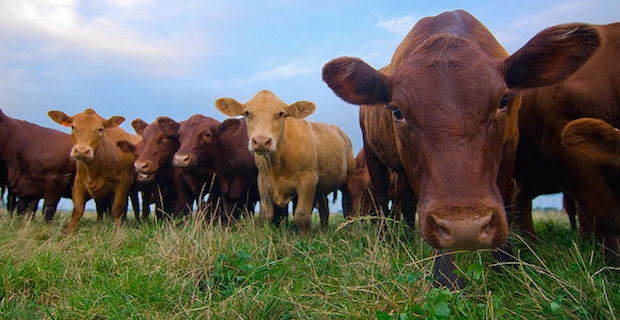
Cheese is the ultimate snack for your family. Full of calcium and healthy fats, it’s convenient to pack in a lunch box or top a sandwich. But when you’re shopping for cheese for your family, there are a lot of choices: grass-fed, organic, and conventional. We tend to think that an organic product is better than conventional cheese, but is grass-fed dairy cheese worth the additional cost? We think so. Here are the top 10 reasons that organic cheese made with grass-fed dairy is a better choice for your family
1. No GMOs or Synthetic Pesticides and Herbicides Used in Organic Cow Feed or Pastures.
We’ve written before about the dangers of the glyphosate found in these products, as well as the potential dangers of GMOs. Grass-fed and USDA Organic cows are not exposed to these toxins, so you can feel safer feeding organic cheese to your family.
2. No Growth Hormones (rBGH) Used on Organic Cows.
Those conventional dairy cows are usually given rBGH, a growth hormone that increases milk production. However, it also causes problems in the cows, including mastitis. According to Robyn O’Brien writing at BreastCancer.org, this condition is a painful infection that “causes cows to pump out bacteria and pus, along with milk.” Not only that, but rBGH produces a chemical that has been linked to breast cancer. Several states have passed bills preventing conventional milk farms that do not use rBGH from putting that on the label – meaning you have no way to know if it’s in your milk unless you buy organic. And how is mastitis treated? With antibiotics, of course.
Read more about what 'grass fed' actually means
3. No Antibiotics Used on Organic Cows.
Conventional dairy cows raised in large-scale farming operations are treated with antibiotics for both disease prevention and for promoting growth, rather than just for treating illness. A study published by the Stanford University School of Medicine shows that this increased antibiotic usage may actually be spreading Salmonella bacteria among cows and livestock. The USDA Organic label guarantees that antibiotics cannot be used on an animal. If a cow does get sick, it can be treated with antibiotics but then must be removed from organic production.
4. Grain-Fed Cows are More Susceptible to E. coli Outbreaks.
A cow’s system was not developed to digest grains, but grasses. Organic Consumers Association writer Jo Robinson explains that when cows eat grains instead of grass, their stomachs become more acidic, and acid-resistant bacteria begin to grow. In other words, it throws their gut out of balance making them vulnerable to E. coli food poisoning, which can get passed to human milk drinkers.
5. Less Frequency of Contagious Illnesses Among Grass-Fed Dairy Cows.
When free-range dairy cows are farmed without antibiotics and rBGH and provided a high standard of animal welfare, your milk is much safer from the dangers of Salmonella and other contaminants with risk factors for cancer and other illnesses.
6. Higher Conjugated Linoleic Acid (CLA) Benefits from Grass-Fed Dairy Cows.
CLA is a beneficial fatty acid that has been linked to the loss of body fat, as well as possibly preventing cancer. A study from the Harvard School of Public Health also shows that people with high concentrations of CLA had a lower risk of a heart attack. While CLA is available in supplement form and in conventional milk, grass-fed dairy cheese benefits from a naturally higher level of CLA, giving you a more potent bang for your caloric intake.
7. Increased Omega-3 Benefits from Grass-Fed Dairy.
Studies show that grass-fed dairy has higher concentrations of healthy Omega-3 fatty acids, which are good for your heart and brain. In fact, grass-fed dairy may even boast a better Omega-3 to Omega-6 ratio (4:1 or less, compared to 7:1 or more), according to this article at The World’s Healthiest Foods. These fatty acids are essential to the body and are healthy when properly balanced, but most Americans have too much Omega-6 in their bodies, putting their health in jeopardy.
8. More Nutrients in Grass-Fed Dairy.
According to Prevention Magazine, another benefit of grass-fed dairy is that it contains a bigger diversity of nutrients including vitamins A, D, and B-12. It also contains other vitamins, minerals, phytonutrients, and antioxidants in addition to calcium and protein.
9. Grass-Fed, Organic Farms Tend to Raise Cows Humanely.
Cows that are raised according to USDA organic standards and are grass-fed are more likely to be treated humanely than cows from conventional dairy farms.
10. Grass-Fed, Organic Cheese Tastes Better.
I know this is a matter of personal opinion, but as a long-time cheese aficionado, I had all but given up on eating it. My kids are dairy-free, and dairy-free cheese is just unpalatable to me. I recently tried some organic grass-fed cheese – and now I am hooked! Without all the processed nonsense that you can find in a conventional bar of cheese, organic grass-fed cheese is hearty, delicious, and smooth – a snack I no longer feel any guilt about.
Read more about cheese and how you might be addicted to it
The Verdict? Grass-Fed Dairy is Better!
If you’ve forgone cheese for a long time, this may be your chance to welcome a healthier, safer option and experience the benefits of cheese made with organic, grass-fed dairy. It never tasted so good!
Written by Gina Badalaty for Mamavation.
Image: U.S. Department of Agriculture










